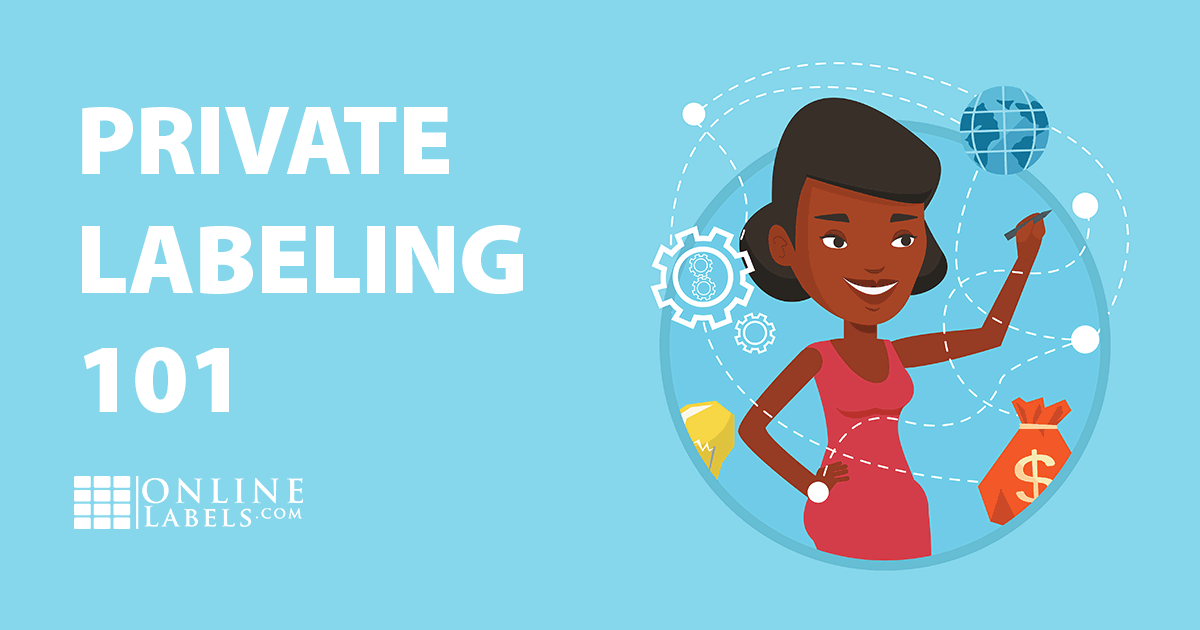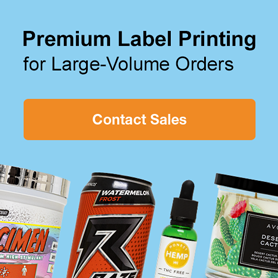How To Start A Private Label Business

So you've decided to start your own private label business. Congrats, it's going to be a fun and interesting journey! Here's a 101 on how to private label your first product.
What Is Private Labelling?
Also known as "white label," private label is when a person or company pays another company to manufacture a product without own branding, logo, etc. The person or company then adds their own name and design to the packaging.
Popular examples of this include Walmart's Great Value brand and Target's Up & Up.
So what kinds of things can be private labeled? Pretty much anything under the sun – from skincare and nutritional supplements to baby essentials, pet products, and kitchen utensils.
The beauty of private labelling is that you don't have to create or invent anything new. As long as it's not a patented item (and a company is willing to white label with you) you can put your logo on it and call it yours.
New to this whole process? You may also want to explore white labelling versus dropshipping and handmade.
Deciding What To Private Label
You may be asking yourself what's a viable product to private label. The key to this step (and arguably the most important step of starting a private label business) is product research – you need to find out which products are in demand to know that your product will sell.
You can use programs like WordTracker to see what people search for on the web and get ideas of what you can sell from there. If you plan to start your private label business on Amazon, you'll want to use a research tool that tracks what people search for within that site specifically. Popular programs for this include Jungle Scout and Helium 10. They both offer multiple tools to help you begin your Amazon private label business journey.
What Makes A Good Private Label Product
The main key to keep in mind when searching for a product private label is to find something that:
Is in high consumer demand and has low seller competition. This will help you avoid getting stuck with product you won't be able to sell.
Has a good profit margin. Take into account how much the product will cost you vs. how much you'll sell it for. Check out our product pricing guide for help on this topic.
Don't forget to factor in shipping costs from your supplier to you and from you to your customer, packaging and storage fees if your product will be stored in a warehouse, and any fees associated with with selling online (like Amazon FBA fees).
Is within your budget. Whether your startup investment budget is large or small, you need to take into account how many units you'll need/want to order and how much of your budget that'll eat up.
How To Find Suppliers
Once you have a product in mind that you'd like to private label, it's time to look for a manufacturer or trading company that offers private label service.
You can choose to manufacture your product anywhere in the world. And many times, where you choose to have your product made will depend on the type of product you choose.
For example, if you're looking to sell toys or electronics, China may be worth considering since they tend to make a lot of these types of products for very low prices. If you choose to go this route, consider searching on Alibaba or AliExpress. Both of these websites are wholesale marketplaces where manufacturers and trading companies list their products, and you can find virtually anything.
If you're choosing to sell food, nutritional supplements, beauty products, or anything else you put in or on your body, it's a better idea to source in the U.S. due to all of our government regulations. For domestically sourced products, search on Google. Say you're looking to source vegan deodorant, just type "vegan deodorant private label USA" in Google to get a list of companies that can private label vegan deodorants.
What To Ask Private Label Suppliers
Once you've drafted a list of potential suppliers, it's a good idea to contact each one and ask several questions.
Pricing Per Unit
The price for each item will likely already be available for you to see on the website. However, most suppliers offer a discount based on how many units you purchase. For example, buying 100 units will cost you more per unit than if you buy 1,000 units. Think of the old adage, "The more you buy, the more you save."
Ask each supplier what the price per unit would be for orders of 100-500 units, 501-1000 units, 1001-5000 units, and 5001+ units (including packaging). Knowing this information will help you calculate your profit margin, as well.
MOQ
This is a common term used in the private label/wholesale world and it stands for "minimum order quantity" or the minimum amount of units you can order at a time. Most suppliers will list their MOQ on their website/product listing, while you'll just have to ask for others.
A supplier's MOQ can be as little as 5 units, while others' can be 1,000 and beyond. While this can sometimes be negotiable, it's a good idea to ask this up front so that you can plan and budget accordingly.
Customisation
Whether you're looking to add your logo to the product, customise packaging, or make adjustments/improvements to the product itself, it's good to know what the factory is and isn't able to do ahead of time so that you can avoid having to switch suppliers later on.
Production Time
Knowing how long it will take your supplier to fulfill orders is beneficial as your private label business starts to grow and you start to plan for future orders. The standard is usually about 15 days (depending on the product and size of the order), but it can go upwards from there.
Response Time
Take note of how long the supplier takes to get back to you, keeping in mind that you're beginning a potential long-term business relationship. You'll want to ensure your contact person is reliable, timely, and answers your questions clearly.
If your supplier is located in a different country, take into account that they're in a different time zone and that you may not get a reply immediately. Being available during their business hours can make the process quicker.
Samples
Ask for samples so you can evaluate the quality and overall functionality. Some suppliers can send a sample for free while others may charge a small fee. Either way, it's definitely not something you want to skimp out on, especially if you're looking to offer your customers the best quality.
Customising Your Product
Customising your product will play a huge role in how your product will sell. Ask yourself, "What's going to set my version apart from the competition?" The answer to this is crucial in getting a potential buyer to pick your product over a more-established, well-reviewed company's product.
Maybe it's as simple as offering color variations or having fancy packaging, or more in-depth like improving a feature that you find could be better. Some customisations like product improvements will likely be done through your supplier, while others like custom labelling with product details and a logo can be done yourself or through your supplier.
OnlineLabels.com offers hundreds of product and packaging labels that can easily be designed and customised using Maestro Label Designer if you choose to do the labelling yourself.
The key message here is to customise your product in some way. Stand out by making it unique (and better) than your competitors'. You don't want to offer the same exact product as another brand by simply slapping your label on it.
Selling Your Private Label Product
You can choose to sell your private-label line of products anywhere. Here's an expansive list of places to sell online or tips on how to get into stores. We've summarised the most popular options below.
Amazon
The biggest and most obvious pro to selling on Amazon is potential visibility. With it being the largest marketplace in the world (with over 150 million Prime subscribers in 2020), it's no doubt that people trust Amazon, so selling on their platform gives you that advantage.
However, there are quite a few fees involved with selling on Amazon and you need to determine if that would eat too much into your profit margins. Weigh the costs of seller-fulfillment versus Amazon FBA. Also note that if you're planning to sell with Amazon FBA, you'll be required to place FNSKU labels on each unit.
A Personal Online Store
Creating your own online store to sell your private label products can definitely save you some money, as you don't have to worry about multiple fees associated with fulfillment, storage costs, sales, etc. However, you should have a solid marketing plan in line in order to drive traffic to your website to make sales.
Brick-And-Mortar
Having your product sit on the shelves of an actual store gives buyers the chance to see your product who may have otherwise never thought of it. In other words, consumers have to literally "search" for products they want to buy online … but if they don't think of it, they won't search and likely won't come across it (unless you spend serious bucks on promoting it).
If customers are already at a store and happen to see it, at the least it's creating brand/product awareness. Fees and qualifications for having shelf-space vary by store, but starting at small, family-owned shops can be a good place to start. Learn more about partnering with boutiques.
Markets
Farmer's markers and craft fairs are on the rise. Consumers love buying local and want to support the artisans in their community. They're a great place to get immediate customer feedback, too. Find out how to start selling at farmer's markets and find artisan markets.
Don't limit yourself. Start with a combination of platforms, websites, and in-person stores. Over a period of time, you'll be able to see how many sales you make from each one, how much revenue is generated on each, etc. Then you can continue with only what's profitable.
Starting your private label business is definitely a journey and it can be months before you're able to put your product on the market. But if you do your product research, choose the right supplier, differentiate your product from the competition, and price it right, the journey can be well worth it.


